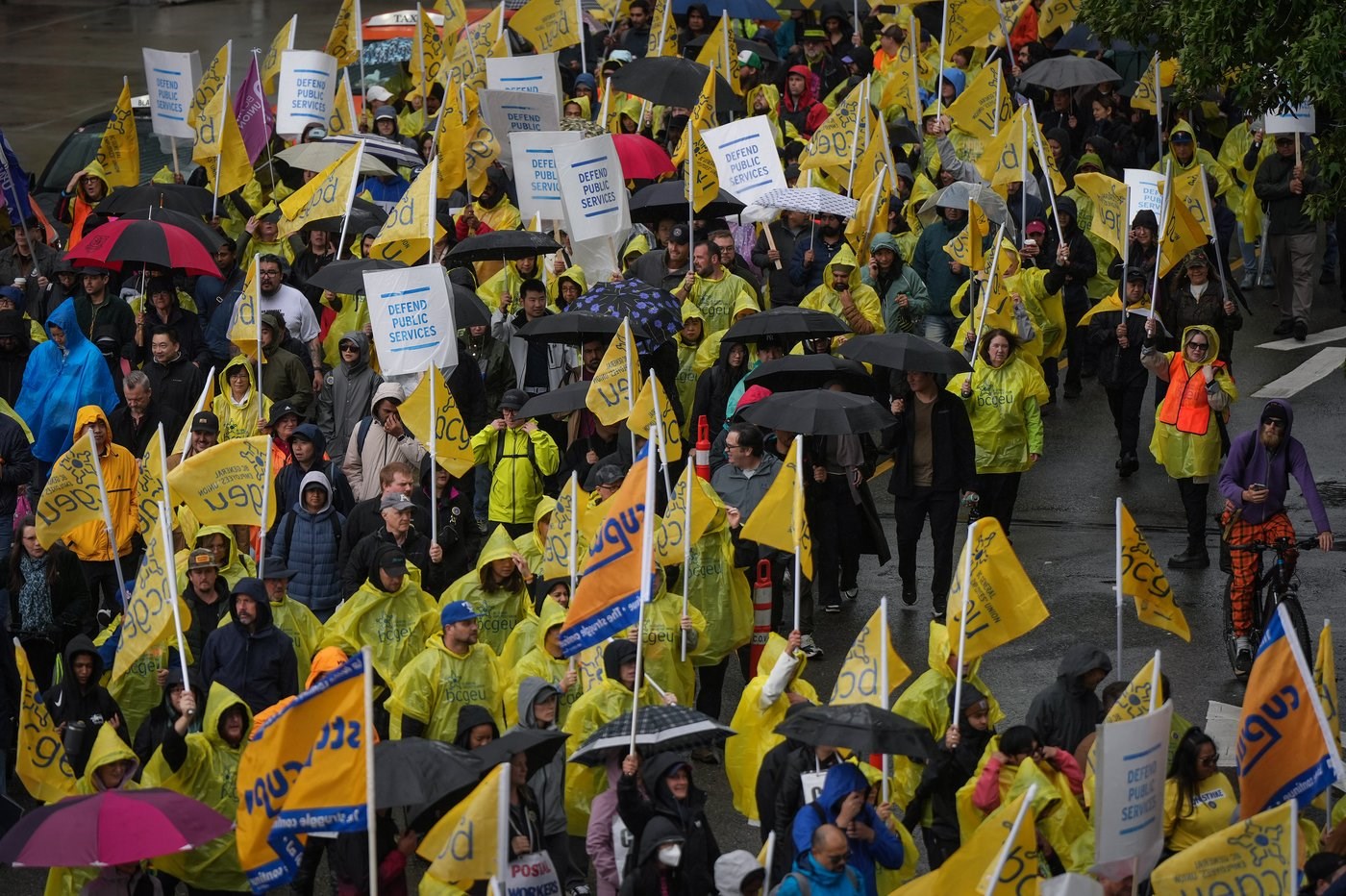
B.C. General Employees' Union (BCGEU) members and supporters march to a rally in Vancouver, on Wednesday, Oct. 1, 2025. Hundreds of British Columbia public sector workers marched through downtown Vancouver Wednesday in a push for a new contract, after talks with provincial government negotiators broke down shortly after they had resumed earlier this week. THE CANADIAN PRESS/Darryl Dyck
Republished October 07, 2025 - 3:48 PM
Original Publication Date October 07, 2025 - 10:26 AM
VANCOUVER — Too many wildland firefighters "hang up their boots" in British Columbia as wages and working conditions erode, but losing that experience could also mean billions in losses, a wildland firefighter says.
Sebastian Kallos has been working with BC Wildfire Service for about 15 years and said Tuesday that if mistakes are made in the backcountry, a wildfire might go from one hectare to two or five, but only brush and trees are lost.
"But if you make a mistake adjacent to a community, the cost could be billions of dollars in lost value, like communities being wiped off the face of the Earth."
Kallos, who is also the vice-president of the B.C. General Employees' Union, has been fighting for better wages and working conditions for his fellow firefighters.
He is among 25,000 public service workers participating in job action, asking for the provincial government to return to the bargaining table with a better offer.
Wildland firefighters are part of essential services, which restricts their strike activity, but the season is wrapping up. The BC Wildfire Service website says there are still about 100 wildfires burning in the province although just two per cent of those are out of control.
This is the sixth week of job action by the union, which has a membership of 34,000.
Union president Paul Finch said last week that their members face an affordability crisis, and if wages don’t keep up with inflation, skilled workers will be lost, including wildland firefighters, who “are among the lowest paid employees in the entire government.”
Finch said wildland firefighters are making a starting wage of $28 an hour, a wage that does not reflect the work they do in protecting communities.
"We told them of a reality of wildfire fighters making $28 an hour, forced to work endless overtime without seeing their families over the summer, just to make enough money to get by," Finch said at the rally in downtown Vancouver.
Kallos said they have lost a lot of members over the years to other municipal firefighting positions, where the hourly compensation is higher and the work-life balance is a bit more manageable.
He said being a wildland firefighter can be tough on their families, as they work for weeks straight in the summer.
"I think that's probably one of the leading reasons why folks hang up the boots in wildfire is that their significant others are pressuring them to be around more," said Kallos.
He said wildfire seasons in B.C. are becoming more intense, with many burning in and around communities more often.
"We really need the experience there, and there's less room for error," said Kallos.
Kallos said the provincial government needs to increase the compensation and improve how wildfire fighters are trained, recruited, and retained to ensure no mistakes are being made during firefighting efforts close to communities.
The union announced on Tuesday that more workers would be conducting job action, as it increases pressure to get a new contract.
The BCGEU said it has added 48 work sites to the picket list, with another 2,600 workers taking part in strike action.
The additional pickets are at another 18 provincial liquor and cannabis retail stores as well as about 30 B.C. offices for natural resources and land-use permits.
The union also said that as of Tuesday, every work site in the Ministry of Finance and the Ministry of Water, Land and Resource Stewardship is on strike.
There were brief talks last week, but the two sides couldn't come to an agreement, with workers demanding higher wages to address cost-of-living concerns and the government trying to find a deal amid fiscal constraints.
Premier David Eby said last week that his government's latest offer was five per cent over two years, but the BCGEU said that figure bundles in market adjustments and other factors, and isn't a direct increase to general wages.
"Without fair wages, the government risks losing the very workers who keep B.C. running — from wildfire crews and social workers to sheriffs, IT professionals, and front line administrators," said the statement from the union on Tuesday.
The B.C. deficit is forecast as a record $11.6 billion, and Finance Minister Brenda Bailey has said the deal must be fair to both workers and taxpayers.
Kallos said the union will continue to escalate the job action if the province refuses to come back to the table.
"At the rate that we're escalating, the full public service is going to be out, except for the essential workers," said Kallos.
The B.C. Ministry of Finance didn't immediately respond to a request for comment.
This report by The Canadian Press was first published Oct. 7, 2025.
News from © The Canadian Press, 2025